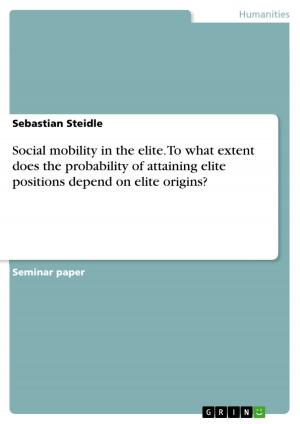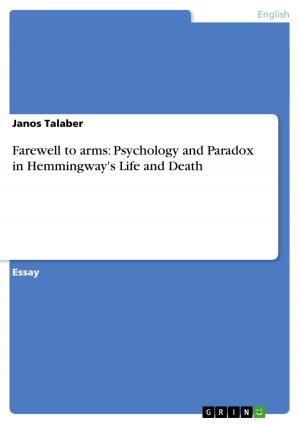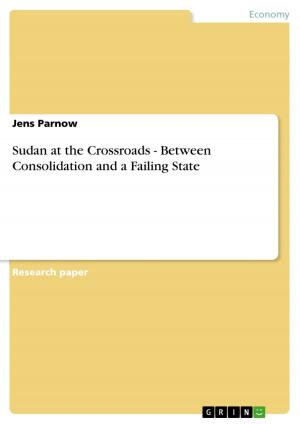| Author: | Steve Nowak | ISBN: | 9783640548378 |
| Publisher: | GRIN Publishing | Publication: | March 2, 2010 |
| Imprint: | GRIN Publishing | Language: | English |
| Author: | Steve Nowak |
| ISBN: | 9783640548378 |
| Publisher: | GRIN Publishing |
| Publication: | March 2, 2010 |
| Imprint: | GRIN Publishing |
| Language: | English |
Seminar paper from the year 2009 in the subject History Europe - Other Countries - Modern Times, Absolutism, Industrialization, grade: 1,0 (A), East Tennessee State University (History Department), course: Homelands and Identity , language: English, abstract: Taking a look at any map of Europe, we can see a Europe of Nations. Neatly arranged side by side, there are various territories belonging to people who claim a unique culture, labeling themselves with national coats of arms and certain flags while singing a distinct national anthem. We know the European peoples and it appears as if they have had their separate nations naturally - be it a kingdom or a republic. However, it has not always been the case and we know that nationalism is a rather young phenomenon. European societies have very different political traditions that are worth a closer look. There is an obvious discrepancy between the East and the West. While nations like England, France and later Italy and Germany arose, Central and Eastern Europe was characterized by multicultural empires and occupied peoples. Especially startling seems to be the history of the Polish people. Living in a former powerful kingdom that vanished from the European map during the eighteenth century they have built a new nation in the twentieth century. 'The Polish people has not died; [...] Their soul has descended to the domestic life of enslaved peoples [...] It will return, will revive and will liberate all enslaved peoples of Europe.' Thus wrote Adam Mickiewicz 1832. What had happened? Barely one century after the Polish army had saved Christian Europe from the invading Turks at Vienna, the Polish kingdom had suffered a disastrous fate. After the death of king August III. in 1763, Russia and Prussia had strengthened their influence on the Sejm and made Stanislaw Augustus Poniatowski his successor. But this had only been the beginning of what Mickiewicz referred to. During the following decades of struggle, Poland had been divided among the surrounding powers Habsburg, Russia and Prussia and ceased to exist on the European map by 1795. For more than a century, there would not be a sovereign Polish state. According to the Congress of Vienna, the Polish were only promised to get autonomy for their own state within the Russian Empire. [...]
Seminar paper from the year 2009 in the subject History Europe - Other Countries - Modern Times, Absolutism, Industrialization, grade: 1,0 (A), East Tennessee State University (History Department), course: Homelands and Identity , language: English, abstract: Taking a look at any map of Europe, we can see a Europe of Nations. Neatly arranged side by side, there are various territories belonging to people who claim a unique culture, labeling themselves with national coats of arms and certain flags while singing a distinct national anthem. We know the European peoples and it appears as if they have had their separate nations naturally - be it a kingdom or a republic. However, it has not always been the case and we know that nationalism is a rather young phenomenon. European societies have very different political traditions that are worth a closer look. There is an obvious discrepancy between the East and the West. While nations like England, France and later Italy and Germany arose, Central and Eastern Europe was characterized by multicultural empires and occupied peoples. Especially startling seems to be the history of the Polish people. Living in a former powerful kingdom that vanished from the European map during the eighteenth century they have built a new nation in the twentieth century. 'The Polish people has not died; [...] Their soul has descended to the domestic life of enslaved peoples [...] It will return, will revive and will liberate all enslaved peoples of Europe.' Thus wrote Adam Mickiewicz 1832. What had happened? Barely one century after the Polish army had saved Christian Europe from the invading Turks at Vienna, the Polish kingdom had suffered a disastrous fate. After the death of king August III. in 1763, Russia and Prussia had strengthened their influence on the Sejm and made Stanislaw Augustus Poniatowski his successor. But this had only been the beginning of what Mickiewicz referred to. During the following decades of struggle, Poland had been divided among the surrounding powers Habsburg, Russia and Prussia and ceased to exist on the European map by 1795. For more than a century, there would not be a sovereign Polish state. According to the Congress of Vienna, the Polish were only promised to get autonomy for their own state within the Russian Empire. [...]















